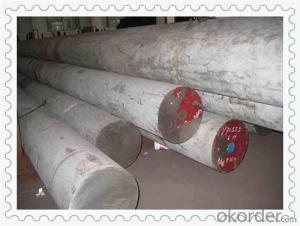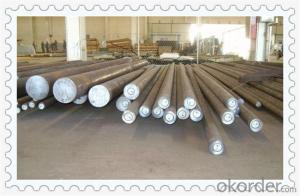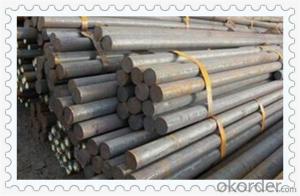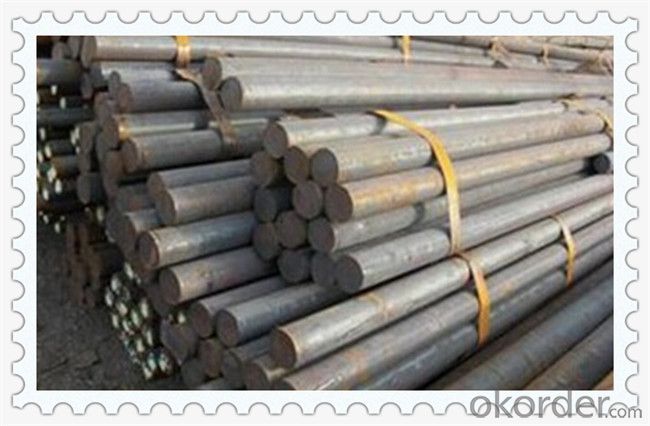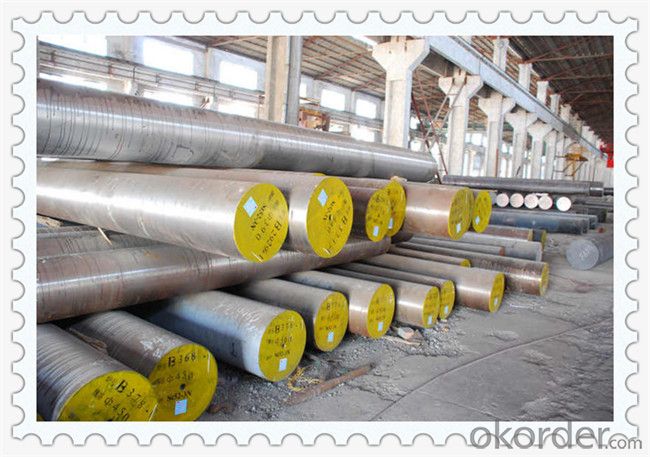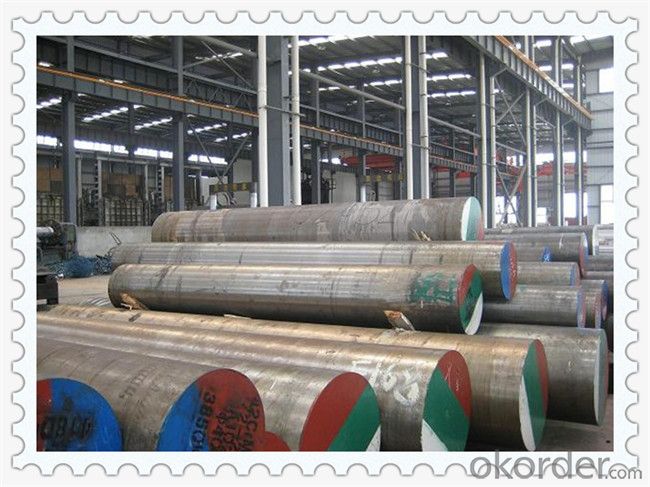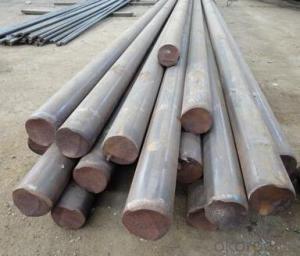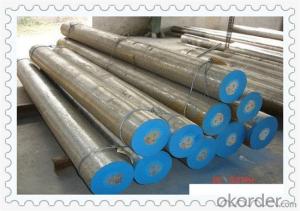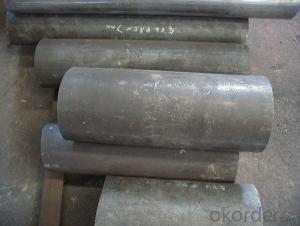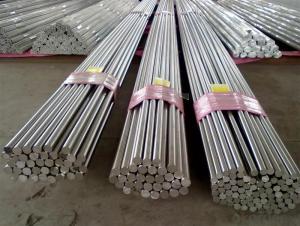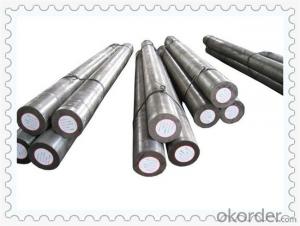SAE 1060 Carbon Steel Round Bars
- Loading Port:
- China main port
- Payment Terms:
- TT OR LC
- Min Order Qty:
- 30 m.t.
- Supply Capability:
- 10000 m.t./month
OKorder Service Pledge
OKorder Financial Service
You Might Also Like
SAE 1060 Carbon Steel Round Bars
Technical Paramenters
Chemical Composition | Mechanical Properties (In Quenched & Tempered State) | ||
C | 0.57-0.65 % | Tensile strength(MPA) | ≥675(69) |
Si | 0.17-0.37 % | Yield strength (MPA) | ≥400(41) |
Mn | 0.50-0.80 % | Elongation (δ5/%) | ≥12 |
Cr | ≤0.25 % | Reduction in Area (ψ/%) | ≥35 |
Ni | ≤0.25 % | Hardness | ≤255HB |
P | ≤0.035 % |
| |
S | ≤0.035 % |
| |
Cu | ≤0.25 % | ||
Products Show
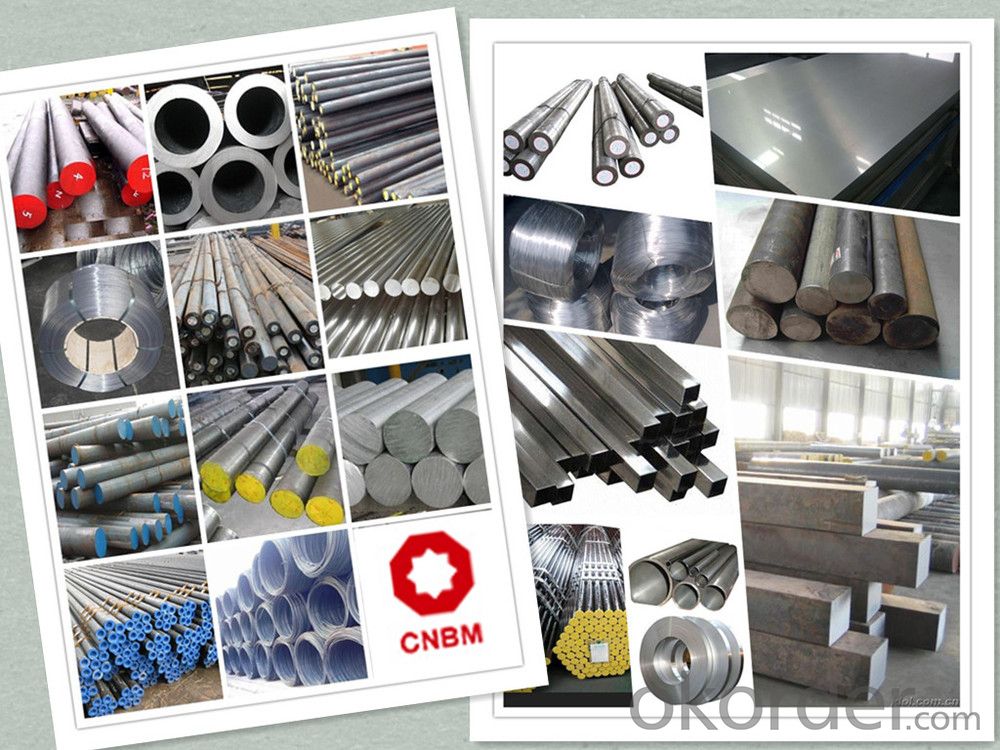
Product Overviews
Description | Carbon Steel Rod/Carbon Steel Bar,carbon steel rod,carbon steel shaft,mild steel bar, Mild steel shaft,ms bar | |
Material | ASTM | 1005,1006,1008,1010,1015,1020,1025,1030,1035, 1040,1045,1050,1055,1060,1065,1070,1080,1084, 1016,1022 |
DIN | Ck10,Ck15,Ck22,Ck25,Ck30,Ck35,Ck40,Ck45,Ck50, 30Mn4,40Mn4 | |
BS | 040A04,095M15,045M10,080A40,045M10,080M50 | |
Standard | GB/T799,ASTM A29,A108,A321,A575,BS970,DIN1652,JIS G4051 | |
| Section shape | Round,square,hexagonal,flat,angle | |
| Surface | Black painted,galvanized | |
Specifications | Round bar | Diameter: 10mm~1200mm |
Angle bar | Size: 3mm*20mm*20mm~12mm*800mm*800mm | |
Square bar | Size: 4mm*4mm~100mm*100mm | |
Flat bar | Thickness: 2mm~100mm | |
Width:10mm~500mm | ||
| Hexagonal | Size: 4mm~800mm | |
Length | 2m,4m,5.8m,6m,11.8m,12m or as required. | |
Application
| Carbon Steel | Mold bottom, Plastic mold, Construction machinery parts Automobile parts, Security grills, Screens, Construction |
| Bearing Steel | Aerospace, Navigation, Nuclear energy, Chemical industry Electronic information, Petrochemical, Instrument and meter Transportation |
| Cr-Mo Steel | Mechanism & Fasteners gear, Stressed components for vehicles Engines and machines, Parts of larger cross-section |
| Gear Steel | All kinds of gears, Statically and dynamically stressed component for vehicles Engines and machine, Larger cross-section parts, Crankshafts |
Work Shop
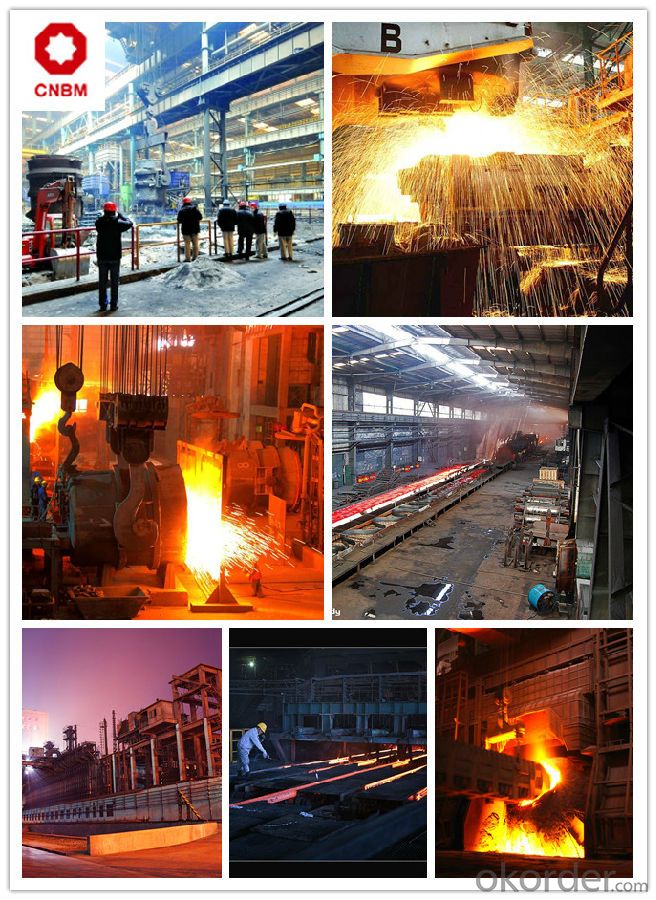
Company Information
CNBM International Corporation is the most important trading platform of CNBM group.
Whith its advantages, CNBM International are mainly concentrate on Cement, Glass, Iron and Steel, Ceramics industries and devotes herself for supplying high qulity series of refractories as well as technical consultancies and logistics solutions.


FAQ
1, Your advantages?
professional products inquiry, products knowledge train (for agents), smooth goods delivery, excellent customer solution proposale
2, Test & Certificate?
SGS test is available, customer inspection before shipping is welcome, third party inspection is no problem
3, Factory or Trading Company?
CNBM is a trading company but we have so many protocol factories and CNBM works as a trading department of these factories. Also CNBM is the holding company of many factories.
4, Payment Terms?
30% TT as deposit and 70% before delivery.
Irrevocable L/C at sight.
5, Trading Terms?
EXW, FOB, CIF, FFR, CNF
6, After-sale Service?
CNBM provides the services and support you need for every step of our cooperation. We're the business partner you can trust.
For any problem, please kindly contact us at any your convenient time.
We'll reply you in our first priority within 24 hours.
Packaging & Delivery
1, Packaging: seaworthy package or as required
2, Delivery: 35-45 days or based on quantity
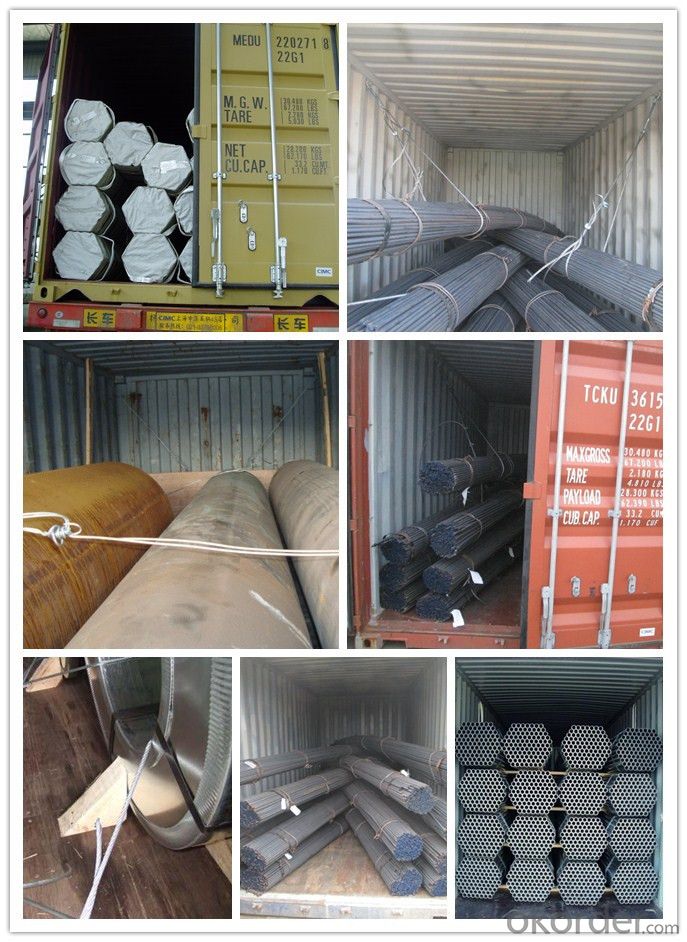
- Q: What are the advantages of using nickel-molybdenum-vanadium alloy steel round bars?
- Nickel-molybdenum-vanadium alloy steel round bars offer several benefits due to their unique properties. Firstly, they possess remarkable strength and durability, making them suitable for applications that demand structural integrity. Industries such as construction, automotive, and aerospace can benefit from this alloy's ability to withstand heavy loads and resist deformation. Additionally, these round bars exhibit excellent resistance to corrosion. The inclusion of nickel and vanadium in the alloy enhances its oxidation and corrosion resistance, even in harsh environmental conditions. Therefore, it becomes a preferred choice for applications that involve exposure to moisture, chemicals, or corrosive substances. Moreover, nickel-molybdenum-vanadium alloy steel round bars possess high heat resistance, making them suitable for use in high-temperature applications. The presence of molybdenum in the alloy enhances its ability to withstand thermal stress, ensuring structural stability even at elevated temperatures. Industries such as oil and gas, power generation, and heat exchangers can benefit from this property. The versatility of these round bars is another advantage. They can be easily forged, machined, and welded, allowing for a wide range of manufacturing processes. This versatility makes them suitable for applications that require complex shapes and designs, such as shafts, gears, and valves. Despite their numerous advantages, nickel-molybdenum-vanadium alloy steel round bars are relatively cost-effective compared to other high-performance alloys. Their excellent combination of properties results in a longer lifespan, reduced maintenance requirements, and improved performance, leading to cost savings over time. In conclusion, the use of nickel-molybdenum-vanadium alloy steel round bars offers high strength and durability, corrosion resistance, heat resistance, versatility, and cost-effectiveness. These properties make them a preferred choice for various industries and applications.
- Q: Can steel round bars be used for making drill bits?
- No, steel round bars cannot be used for making drill bits. Drill bits require specific materials and manufacturing processes to ensure their durability and effectiveness. Drill bits are typically made from high-speed steel (HSS), cobalt steel, or carbide. These materials are chosen for their hardness, heat resistance, and ability to withstand the high forces and temperatures generated during drilling. Steel round bars, on the other hand, are not specifically designed or manufactured to meet the requirements of drill bits. Using steel round bars for making drill bits would result in inferior performance, increased wear, and potential breakage during drilling operations. It is important to use drill bits that are specifically designed and manufactured for the purpose to ensure efficient and safe drilling operations.
- Q: What are the common finishes for steel round bars?
- There are several common finishes for steel round bars, each offering unique properties and aesthetic appeal. Some of the most common finishes include: 1. Hot Rolled: This finish is achieved by rolling the steel at a high temperature, which creates a rough and scaled surface. It is commonly used for applications where a rough texture is desired, such as structural components or machinery. 2. Cold Rolled: This finish is achieved by rolling the steel at room temperature, resulting in a smoother and more polished surface. It is often used in applications where a clean and precise appearance is required, such as in the automotive or aerospace industries. 3. Turned and Polished: This finish involves machining the steel round bar to achieve a smooth and polished surface. It is typically used for decorative purposes or in applications where a high level of precision is required, such as in the manufacture of shafts or fasteners. 4. Ground: This finish involves grinding the steel round bar to remove any surface imperfections or irregularities. It results in a smooth and uniform surface, making it suitable for applications where tight tolerances or a consistent finish are essential. 5. Coated or Plated: Steel round bars can also be finished with various coatings or platings to enhance their corrosion resistance or aesthetic appeal. Common options include galvanizing, which involves applying a layer of zinc to protect against rust, or chrome plating, which provides a shiny and attractive finish. Ultimately, the choice of finish for a steel round bar depends on the specific requirements of the application, such as the desired appearance, corrosion resistance, or mechanical properties needed.
- Q: Can steel round bars be used in the production of agricultural machinery?
- Yes, steel round bars can be used in the production of agricultural machinery. Steel is a durable and strong material that is commonly used in various industries, including agriculture. Steel round bars can be utilized for manufacturing components such as axles, shafts, and frames, providing stability and strength to agricultural machinery.
- Q: Can steel round bars be used for making tie rods?
- Yes, steel round bars can be used for making tie rods. Steel round bars are commonly used in construction and engineering applications due to their strength and durability. Tie rods are used to provide structural support and stability, and steel round bars are well-suited for this purpose. They have high tensile strength and can withstand heavy loads and tension, making them an ideal choice for tie rods. Additionally, steel round bars can be easily fabricated and welded, allowing for customization and versatility in the design and construction of tie rods.
- Q: Can steel round bars be used in marine environments?
- Yes, steel round bars can be used in marine environments, but they need to be made from corrosion-resistant materials such as stainless steel or galvanized steel to withstand the corrosive effects of saltwater.
- Q: Are steel round bars suitable for the production of valves?
- Indeed, valves can be produced using steel round bars. Steel is a widely employed material in valve manufacturing owing to its exceptional mechanical characteristics, including remarkable strength, durability, and resistance to corrosion. By machining and shaping steel round bars, one can effortlessly create diverse valve components that provide the essential strength and stability to endure high pressure and temperature conditions. Moreover, through heat treatment, the mechanical properties of steel round bars can be enhanced, thus further boosting the performance and reliability of valves. In summary, steel round bars are an appropriate option for valve production as they guarantee functionality and longevity in a multitude of industries and applications.
- Q: What is the tensile strength of a steel round bar?
- The tensile strength of a steel round bar depends on various factors such as the specific grade of steel, the manufacturing process, and any additional treatments or coatings applied. Generally, steel round bars have high tensile strength due to their composition and structural design. The specific tensile strength can vary significantly depending on the grade of steel. For example, low carbon steel typically has a tensile strength of around 400-550 MPa (megapascals), while high carbon steel can have a tensile strength of 700-1000 MPa or even higher. It's worth noting that the tensile strength of a steel round bar can be further enhanced by heat treatment processes such as quenching and tempering, which can significantly increase its strength and hardness. Additionally, certain alloying elements like chromium, nickel, and molybdenum can be added to steel to improve its tensile strength and other mechanical properties. To determine the exact tensile strength of a specific steel round bar, it is crucial to refer to the manufacturer's specifications or consult relevant industry standards such as ASTM (American Society for Testing and Materials) or AISI (American Iron and Steel Institute) standards. These standards provide detailed information on the mechanical properties, including tensile strength, for various grades of steel.
- Q: What is the cost of a steel round bar?
- The cost of a steel round bar can vary depending on factors such as the size, grade, and market conditions.
- Q: What is the mechanical properties of No. 40 round bar?
- 40# stands for steel grades, round bars for steel profiles, mechanical properties for steels, tensile strength, yield point, (cattle / mm, 2) elongation, shrinkage (%), impact energy, Ak (coke), state, hardness, HB<
Send your message to us
SAE 1060 Carbon Steel Round Bars
- Loading Port:
- China main port
- Payment Terms:
- TT OR LC
- Min Order Qty:
- 30 m.t.
- Supply Capability:
- 10000 m.t./month
OKorder Service Pledge
OKorder Financial Service
Similar products
Hot products
Hot Searches
Related keywords
